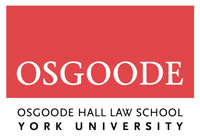
The Women's Court of Canada / Le tribunal des femmes du Canada
The Canadian Journal of Women and the Law with the Institute for Feminist Legal Studies, Osgoode Hall Law School, and the Faculty of Law, University of Toronto
La Revue Femmes et Droit, l'Institut d'études juridiques féministes, la Faculté de droit d'Osgoode Hall et la Faculté de droit de l'Université de Toronto
Present / présentent:
Rewriting Equality / Récrire l'égalité
March 6-7, 2008 / les 6 et 7 mars 2008
Osgoode Professional Development Centre, 1 Dundas Street West, Suite 2602, Toronto
and / et
Faculty of Law, University of Toronto, 78 Queen's Park, Toronto
The Women's Court of Canada (WCC) is an innovative project bringing together academics, activists, and litigators in order literally to rewrite the Canadian Charter equality jurisprudence. Taking inspiration from Oscar Wilde, who once said "the only duty we owe to history is to rewrite it", the WCC operates as a virtual court, and 'reconsiders' leading equality decisions. The WCC renders alternative decisions as a means of articulating fresh conceptions of substantive equality. The first phase of the WCC Project culminated in the publication of the first six WCC judgments in the Canadian Journal of Women and the Law.
The official launch of the WCC on March 6-7 also celebrated International Women’s Day. March 6 featured a lively panel discussion of “Gender and Judging”, followed by a launch reception. This fun-filled evening provided an opportunity to learn more about the WCC, meet and mingle with some of the members of the “Court” and honour all those who have worked toward equality. Several talented performance artists inspired us through dance, poetry, and music with their creative interpretations of the struggle to eradicate women’s inequality.
March 7’s symposium brought together a number of constituencies interested in the direction of equality jurisprudence – public and private lawyers, representatives of community organizations, members of equality-seeking groups, legal academics, and law students - to join in the WCC’s ongoing critique and re-envisioning of Canadian case law. A special opportunity was included for law students to discuss and critique the work of the Women’s Court of Canada.
Co-sponsors
 |  |

Canadian Journal of Women and the Law |
Funding from the following is gratefully acknowledged
The Institute for Feminist Legal Studies
Manitoba Law Foundation
Nova Scotia Law Foundation
North West Territories Law Foundation
Faculty of Law, University of Calgary
Faculty of Law, University of Alberta
Faculty of Law, University of Saskatchewan
